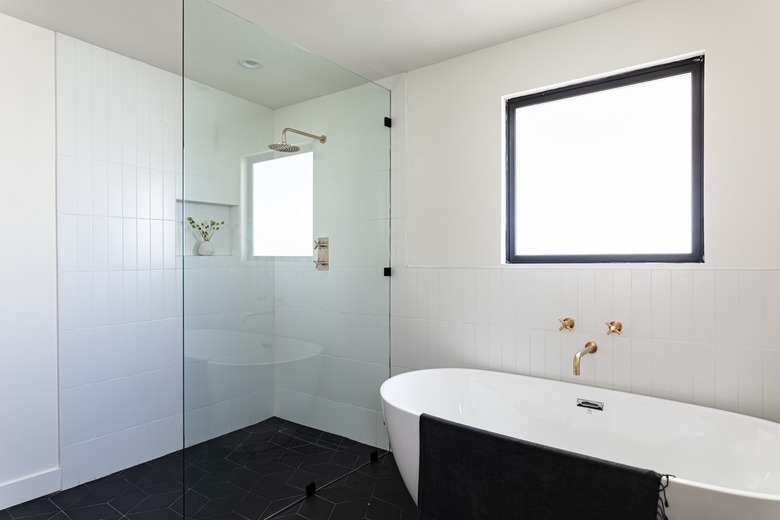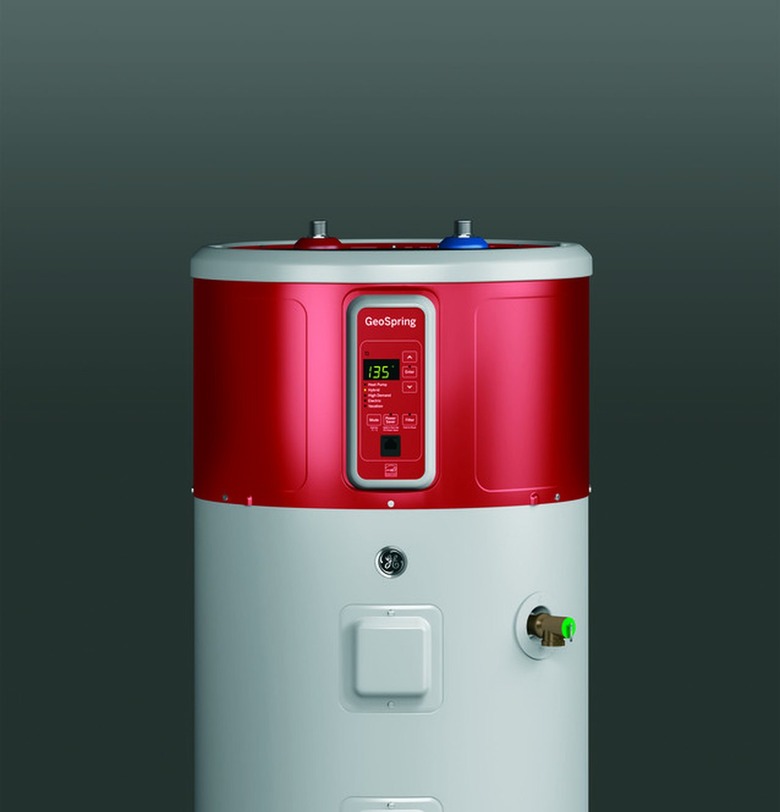Everything You Need To Know About Heat Pump Water Heaters
We may receive a commission on purchases made from links.
Heat pump water heaters represent a revolution in water heating technology and can help homeowners save money while substantially reducing a home's carbon footprint. It may take a few years of use to realize the savings — because new heat pump water heaters are more expensive than conventional ones — but the financial recovery period usually isn't long, especially when replacing a conventional electric water heater. Moreover, homeowners may qualify for incentives, like rebates or a federal tax credit, when installing a new one.
An electric heat pump water heater (HPWH) consumes a quarter of the electricity that electric resistance water heaters do, and the energy costs for heat pump models are about a third of those associated with gas water heaters. That's enough to excite any homeowner, but there's more. Heat pump water heaters are emission-free (like electric water heaters) and actually provide a limited amount of cooling and dehumidification for the space in which they are located. That's great news for people who live in humid climates.
There aren't that many downsides, but one is that a heat pump system doesn't heat water to the same high temperatures as resistive heating elements or gas burners. For this reason, manufacturers offer hybrid heat pump water heaters that employ both a heat pump and resistive heating system. If you have this kind of water heater, you'll never run out of hot water, and if you observe simple water saving practices, you shouldn't ever need the higher temperatures produced by the resistive elements.
What Are Heat Pump Water Heaters?
What Are Heat Pump Water Heaters?
A heat pump water heater essentially pulls heat from the air and moves it to warm up water in a storage tank that's accessed every time you take a shower, a bath, or do the dishes. Heat pump technology isn't unusual or difficult to understand because it's the same technology employed in refrigeration systems. A heat pump is basically a refrigerator running in reverse, or put another way, a refrigerator is a type of air-source heat pump. Both are heat exchangers.
A refrigeration system consists of a closed loop of copper tubing formed into two coils on either end. A compressor pressurizes a refrigerant in one coil — the condenser coil — that turns it into a liquid and releases heat. The coils are separated by a tiny aperture, and as the refrigerant passes through this aperture into the evaporator coil, it vaporizes, which is a process that extracts heat from the surrounding air. In a refrigerator, the evaporator coil extracts heat from the freezer compartment, and the heat is allowed to radiate away from the condenser coil, but in a HPWH, the evaporator coil extracts heat from the surrounding air and transfers it to the condenser coil, which is positioned inside the water tank.
The compressor and evaporator coils are typically located within a housing on top of a heat pump water heater, which adds extra height to the unit — a fact that must be considered when choosing a location. Some manufacturers adopt a modified design of a ductless air conditioner/room heater, which is another type of air-source heat pump, and locate the water heater compressor in a separate outdoor unit. Hybrid heat pump water heaters also have one or more resistive heating elements extending into the tank from the side.
Comparing Purchase and Operating Costs
Comparing Purchase and Operating Costs
Every new water heater has a yellow Energy Guide label that displays two important pieces of information. The first is the annual operating cost for the appliance, and the second is the first-hour rating — the volume of hot water the unit produces in an hour, which depends on the recharge time (aka the amount of time it takes for the water to heat up).
The annual operating cost for a typical 50-gallon electric resistance water heater is above $400, while the cost for a propane or natural gas model of the same size is around $300, which isn't that much lower. The operating cost for a comparable hybrid water heater, on the other hand, is just above $100. A new 50-gallon hybrid water heater costs around $1,200 as opposed to about $600 for a gas or resistive electric model. Given the difference in operating costs, homeowners can make up that difference in two or three years.
Hybrid heat pump water heaters recharge slightly more slowly than gas models, so the first-hour rating is typically lower but not by much. Whereas the first-hour rating for a 50-gallon gas model is around 86 gallons, that for a hybrid HPWH is about 65 gallons. The first-hour rating for a comparable resistive water heater is 61 gallons, so a hybrid HPWH, which combines both resistive and heat pump heating functions, can actually outperform a standard electric model.
Heat Pump Water Heater Electrical Requirements
Heat Pump Water Heater Electrical Requirements
The compressor that powers a heat pump system is basically the same type of compressor that a refrigerator uses, although it's more powerful and consumes slightly more electricity. It typically draws 12.5 amps or less at 120 volts, so if the heater does not include electric heating elements, it can be plugged into a standard 120-volt wall receptacle.
In practical terms, that type of energy economy is more of a target than a common reality because most hybrid heaters include 240-volt resistive heating elements to reduce the recharge time and increase the first-hour rating. Consequently, hybrid water heaters have to be hardwired to a 240-volt circuit like conventional electric water heaters.
The 120-volt plug-in models are on the way, though, and they may even be available in some places. A.O. Smith, Rheem, and GE Appliances have promised to introduce them sometime in 2021. These 120-volt models promise to be easier to install and less costly to operate, but their first-hour ratings will be lower than hybrid models because they take longer to heat water.
Pros and Cons of Heat Pump Water Heaters
Pros and Cons of Heat Pump Water Heaters
Heat pump water heaters offer many benefits to homeowners as well as to the environment, but they aren't without their drawbacks. Whether you're considering one as a replacement for an existing water heater or you're installing one in a newly constructed home, you have a few pluses and minuses to weigh.
Consider the pros of heat pump water heaters:
- The operating costs for heat pump water heaters are lower than those for any other type of water heater, including an electric tankless one, which often requires a 50-amp circuit and enough power to operate three to four air conditioners.
- An HPWH produces no emissions as opposed to tank and on-demand water heaters powered by natural gas or propane.
- Because they exhaust cool, dry air, heat pump water heaters can help cool and dehumidify warm, moist spaces.
- HPWHs are generally easy to install, requiring little more than connection to the water system and to an electric circuit as well as a drain line to handle condensation that drips from the evaporator coil. Ducting is required only for units installed in small spaces with insufficient air volume for efficient air exchange.
Consider the cons of heat pump water heaters:
- To be installed without ducting, an HPWH needs to be installed in a room with at least 700 to 1,000 cubic feet of air space. If installed in a smaller space, it needs both intake and exhaust ducts that extend outside the building.
- Because it draws heat from the surrounding air, an HPWH can't be installed in a cold location. The ambient air temperature should be between 40 and 90 degrees Fahrenheit.
- A heat pump water heater needs slightly more maintenance than a conventional one. It has an air filter that needs to be replaced regularly, and depending on how it's installed, the condensate drain line may need to be cleaned occasionally to prevent mold.
- Without the backup resistive elements, a heat pump water heater may not be able to keep up with high demand. If you have a large family, you may have to stagger showers in the winter to avoid running out of hot water. If reducing your carbon footprint is a top priority, that's a small price to pay.
Shopping for a Heat Pump Water Heater
Shopping for a Heat Pump Water Heater
If you're considering a new heat pump water heater, you want to take advantage of all possible financial incentives, including a federal tax credit of $300 and other incentives offered at the local level. The best way to guarantee this as well as to maximize your energy savings is to purchase a unit with the ENERGY STAR label. An ENERGY STAR certified model has been tested by the Department of Energy, and the certification is a guarantee that you're purchasing the most energy-efficient model available. You can find qualifying models at EnergyStar.gov.
You should size your new water heater according to the number of people in your household. If you choose a model that's undersized, you'll run out of hot water more quickly, but oversizing your water heater means paying too much up front as well as in day-to-day operating costs for extra hot water you'll never use. You can use a size chart as a rough guideline:
- 30 to 40 gallons serves one to two people.
- 40 to 50 gallons serves two to three people.
- 50 to 60 gallons serves three to four people.
- 60 to 80 gallons serves five or more people.
Keep in mind that the amount of hot water you need depends on your water use habits. If your family is in the habit of conserving hot water by taking short showers and combining washing loads, you may be able to get by with a smaller tank size than you would otherwise need. On the other hand, you might want to opt for a larger tank size if your family members take frequent showers or baths.
References
- YouTube: Matt Risinger – $1500 Heat Pump Water Heater – Worth it?
- YouTube: Matt Risinger – 2020 Top 5 Heat Pump Electric Tank Water Heaters
- Energy.gov: Heat Pump Water Heaters
- Energy Star: How it Works — Heat Pump Water Heaters (HPWHs)
- George Brazil Plumbing and Electrical: Tankless vs. Hybrid Heat Pump Water Heaters: Which is Better for Phoenix Homes?
- Green Building Advisor: Attaching Ducts to a Heat-Pump Water Heater
- Green Building Advisor: A New Generation of Heat-Pump Water Heaters is on the Way
- Energy Star: ENERGY STAR Certified Water Heaters

